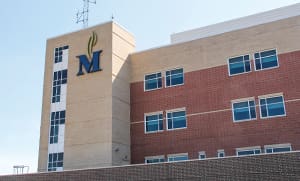Resident Learning Experiences and Activities
Memorial has a variety of rotations and activities to ensure a well-rounded resident experience.
Acute Care Medicine
The pharmacy resident will work with the interdisciplinary team of physicians, nurses, dieticians, and respiratory therapists to optimize the efficacy and safety of medication therapy regimens for a wide variety of disease states. The resident will provide drug information to the team as well as perform medication counseling and education to patients. The resident will assist in evaluation and feedback for PharmD students on APPE rotation. This internal medicine rotation will focus on developing skills and competencies in pharmaceutical care, enabling the resident to be actively involved in medication therapy selection, therapeutic drug monitoring, and communicating effectively with healthcare professionals, patients, and caregivers.
Acute Care Medicine II
During this rotation, the pharmacy resident will serve as a decentralized pharmacist with rotating floor coverage responsibilities. The pharmacy resident will gain patient care experience on the telemetry floor, medical floor, surgical floor, and intensive care unit. Pharmacy residents will work closely with the medical team to provide quality, cost effective pharmacotherapeutic recommendations while minimizing adverse drug reactions. Pharmacy residents will also be responsible for therapeutic drug monitoring, pharmacokinetic dosing, renal dose adjustments, patient counseling, and providing drug information to healthcare professionals.
Ambulatory Care
In the Transitional Care Clinic, residents will be part of a multidisciplinary team including a nurse practitioner, nurse, and dietician. The clinic focuses primarily on the disease states of heart failure and COPD. Most patients are seen as a transition from hospital to home and are followed as needed thereafter. Residents will help provide medication reconciliation, lab monitoring, patient education on pharm and non-pharm therapy, assess adherence, and provide education on disease state management. Opportunities may exist to help precept student pharmacists.
Antimicrobial Stewardship
In contrast to the infectious diseases rotation, this longitudinal rotation is designed to introduce the pharmacy resident to systematic management of ensuring optimal antimicrobial utilization across all services that utilize antimicrobials within both acute care and long-term care settings. The resident will gain skills and knowledge in the core elements of establishing and managing a sustainable and robust antimicrobial stewardship program in both acute care and long-term care settings. In addition, the resident will become familiar with regulatory requirements and serve an integral role on the Antimicrobial Stewardship Program Committee. If so desired, the resident will have the opportunity to become Antimicrobial Stewardship Certified in either acute care or long-term care through participation in an Antimicrobial Stewardship Certificate Program. In conclusion, the resident will be equipped with fundamental skills and knowledge in how to systematically optimize antimicrobial utilization, patient care and outcomes, preserve antimicrobial effectiveness, reduce healthcare expenditures, and ensure regulatory compliance.
Critical Care
The resident will attend daily rounds with the multi-disciplinary ICU team and gain experience caring for a variety of intensive care populations, including medical, surgical, neurological, and cardiac surgery. Under the guidance of the preceptor, the resident will gain experience with pharmacokinetics, drug therapy monitoring, and antimicrobial stewardship in critically ill patients. Residents will work directly with Intensivist physicians and nurse practitioners to determine optimal medication plans for patients on a daily basis. Along with the preceptor, residents will gain experience at the bedside during Code Blue and other intensive resuscitation events.
Emergency Medicine
The Emergency Medicine rotation experience is designed to further develop the resident’s knowledge and understanding of the pharmacotherapy of emergency medicine patients with a variety of disease states in a team-based environment. The resident will develop an understanding of emergency medical care from triage to discharge from the ED and hospitalization. During the rotation, residents will gain an appreciation of how the emergency department pharmacist can enhance the quality of pharmaceutical care delivered in the department and improve the continuity of care throughout the patient’s hospital stay. The resident will be exposed to all types of patients, but prioritization will be given to intensive care unit-based patients. The resident will obtain ACLS certification to actively participate in cardiac and respiratory arrests. During the rotation, the resident will ensure patients are admitted with complete and accurate medication regimens. They will be expected to evaluate pertinent literature, discuss guideline-based care, complete a journal club, in-services, drug information questions, resident led topic discussions and participate in continuous quality improvement committees.
Infectious Diseases
This rotation is designed to enhance the knowledge and skills of infectious diseases by serving an integral role in caring for patients in which the infectious diseases service is consulted. Through this rotation, the pharmacy resident will gain the experience and fundamental skills of ensuring optimal antimicrobial management in common infectious diseases. This includes but is not limited to ensuring appropriate antimicrobial indications and optimal antimicrobial selection, dosing, route, monitoring, and duration of therapy. When applicable, the resident will play a key role in ensuring optimal discharge plans to ensure continuity of care. The pharmacy resident will also become more proficient in the interpretation and application of microbiology, laboratory, and diagnostic results to ensure optimal antimicrobial management. Lastly, the resident will serve as a drug information resource for the infectious diseases service and gain effective communication skills by participating in multidisciplinary interactions with the healthcare team.
Innovative Rotation
This rotation focuses on developing and piloting innovative pharmacy care models in acute or ambulatory care. A focus will be on developing goals with key performance indicators to represent a pharmacist’s impact on a new service line. Topics will include identifying a patient need, key stakeholders for success, resource needs, dashboard development, and implementing a pilot program. The resident will have the chance to select a focus area or patient population that resonates with them.
Management/Administration/Leadership Rotation
This rotation focuses on the pursuit of becoming the national model for pharmacy practice among integrated health care delivery organizations. Residents will work with our pharmacy leadership team to gain exposure and deliver managerial responsibilities. Experiences and topics will include regulatory compliance (JCAHO/HFAP), pharmacy budgeting, employee engagement, policy development, project management, and performance improvement. A focus will be on the resident’s leadership style and strengths to deliver innovative patient-centered care.
Medication Safety
The medication safety rotation will help the resident become familiar with the key principles utilized in hospitals and health systems to improve medication safety. The rotation is designed to expose residents to the medication safety nomenclature, key principles, tools, and available resources. The resident will participate in several activities designed to improve their working knowledge and experience with medication safety concepts while working with the interdisciplinary medication safety team. This experience will enable the resident to apply knowledge in any pharmacy practice setting to improve medication safety for patients.
Staffing / Service Commitment
The resident will be oriented to inpatient pharmacy at Memorial Hospital Belleville and trained on Epic for purposes of participating in weekly staffing activities related to pharmacy practice. The focus of this longitudinal learning experience will be for the resident to gain skills in drug ordering, distribution, verification, preparation, and dispensing. Participation in medication use processes will allow the resident to independently contribute to workflow while expanding the resident’s operational and clinical knowledge. Pharmacy policies and procedures will be outlined for the resident to follow for safe and effective delivery of patient care. After orientation, staffing requirements will be every other weekend.
Sterile Compounding
This elective experience will expose the resident to chapter 797 of the Unites States Pharmacopeia, Pharmaceutical Compounding – Sterile Preparations. The resident will learn how to apply these best practice standards to ensure that sterile preparations meet the clinical needs of patients, while also satisfying quality, safety, and environmental control requirements in all phases of preparation and storage. The resident will gain experience in personnel training and evaluation, environmental monitoring, and regulatory compliance.
Transitions of Care
This rotation focuses on providing safe patient-centered care across many phases of health care. Primary rotation sites include the emergency department and inpatient hospital setting. Rotation responsibilities will include coordination with outpatient services and community pharmacies for medication management and safe admission/discharge planning. The resident will be integrated in multidisciplinary care teams, with daily activities including admission and discharge medication reconciliations, patient counseling and education, and coordination with healthcare team to address medication-related concerns including drug monitoring and therapy recommendations. A wide variety of disease states will be encountered, and residents will have the opportunity to provide staff education and in-services, medication therapy management, and partake in quality improvement projects.
Residency Activities
Presentations and Projects
- 1 longitudinal project (research, publishable MUE, OR quality improvement)
- 3 journal clubs (1 leadership, 2 clinically focused)
- 2 formal patient case presentations
- 1 local or regional CE presentation (ICHP or GLPRC)
- 1 day a month wellness day (focus on project, self-learning, and reflection)
Certification
- Basic Life Support (BLS) certificate and Advanced Cardiovascular Life Support (ACLS) training
- Teaching certificate through Southern Illinois University Edwardsville School of Pharmacy
- Antibiotic Stewardship Certification (optional)

Pharmacy Residency
Learn more about Memorial’s unique experiential residency training program that has an award-winning reputation.
Pharmacy Residency Application
Learn more about our pharmacy residency application process.
Salary and Benefits
Memorial Hospital offers several benefits for the pharmacy residency program.

